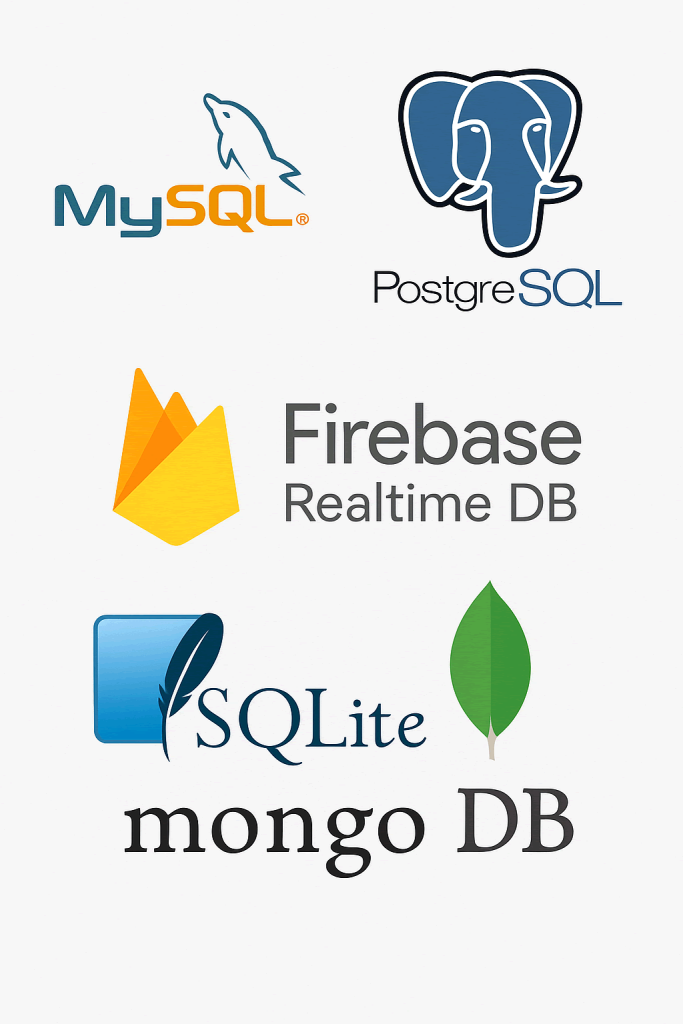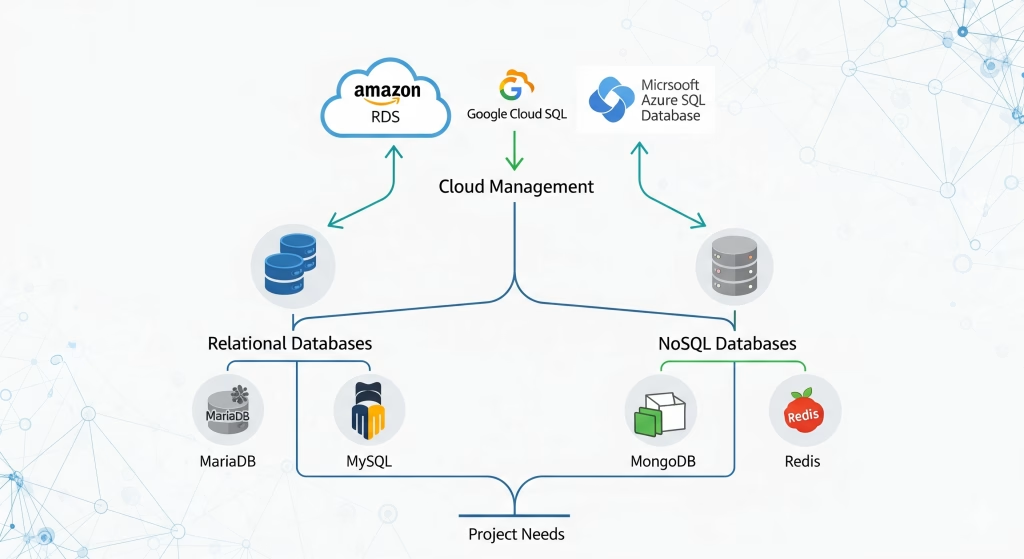
🔄 Optional Add-ons / Custom Integrations
- Elasticsearch – For advanced full-text search.
- Supabase – As an open-source Firebase alternative.
- Amazon RDS / Google Cloud SQL – For managed cloud-hosted databases.
🗄️ Supported Databases
✅ Relational Databases
- MySQL / MariaDB
- Default for WordPress-based sites (Starter, Professional packages).
- Used for small-to-medium business websites and CMS-backed content.
- PostgreSQL
- Preferred for enterprise-grade applications.
- Ideal when data integrity, complex queries, and scaling are priorities.
✅ NoSQL Databases
- Firebase Firestore
- Used for real-time applications, chat systems, and mobile apps.
- Particularly useful in Android development packages or Progressive Web Apps.
- MongoDB
- Available for custom Node.js or MERN stack applications.
- Suitable for document-based content and flexible schemas.
✅ In-Memory Data Stores
- Redis
- Used as a caching layer, session store, or queue engine.
- Integrated in apps requiring fast data retrieval, rate limiting, and analytics.
✅ Embedded / Lightweight Options (on request)
- SQLite
- Used for lightweight internal tools, demos, or embedded mobile features.
- Useful during prototyping or low-traffic utility apps.
MORE LINKS:
What is Fullstack?
What is Backend?
Data storage methods
API creation
3rd party services
Hosting Setup
Backend developer
Project scaling
Average turnaround
WHAT DATABASES DO YOU SUPPORT?
On Wemaxa.com, the choice of databases is always guided by the technical needs and scale of each project. We support a range of database solutions across our service tiers to ensure optimal performance, flexibility, and security. Whether you’re launching a simple website or a full-scale web application, our team selects the right database technology to match the expected workload, structure, and long-term growth of your platform.
For most websites and content management systems, we rely on reliable relational databases like MySQL and MariaDB. These are widely used in WordPress and WooCommerce environments and provide a solid foundation for storing structured content, user data, and product information. They’re known for their stability, wide compatibility, and efficient handling of common web operations, making them a go-to choice for standard site builds and online stores.
For more complex or data-heavy applications, we also support PostgreSQL. It offers advanced features such as custom functions, full-text search, and more precise control over data relationships. Projects that involve financial logic, reporting systems, or large-scale querying often benefit from PostgreSQL’s powerful capabilities. It’s ideal for clients who need deeper technical customization or want to future-proof their infrastructure for expansion.

In cases where performance, scalability, or real-time interaction is a priority, we integrate NoSQL databases like MongoDB and Redis. MongoDB is well-suited for handling large, flexible datasets and is often used in apps with dynamic content or rapidly changing structures. Redis, on the other hand, is implemented for caching and high-speed data retrieval, improving performance in scenarios like user session management or analytics tracking. Whatever the use case, Wemaxa ensures your database layer is thoughtfully matched to your goals, ensuring both performance and stability.
What Databases Do You Support?
At Wemaxa.com, we understand that the choice of database technology is one of the most critical decisions in web application architecture, influencing scalability, performance, security, and overall project maintainability. We provide support for a wide array of database systems, ranging from traditional relational databases such as MariaDB and MySQL to modern NoSQL solutions including MongoDB, Redis, and Couchbase. Our platform allows clients to select the most appropriate database solution based on their specific project needs, whether they prioritize transaction consistency, rapid data retrieval, horizontal scalability, or flexible document storage. By leveraging relational databases, we ensure strong ACID compliance for applications that require strict data integrity, while NoSQL options provide the performance and adaptability necessary for handling large volumes of unstructured or semi-structured data, real-time analytics, and complex caching requirements. Wemaxa also supports cloud-managed database solutions such as Amazon RDS, Google Cloud SQL, and Microsoft Azure SQL Database, giving our clients the flexibility to offload maintenance, backup, and scaling concerns while maintaining optimal performance and high availability for mission-critical applications.

Our development teams are highly skilled in designing database schemas, optimizing queries, and implementing robust security practices to ensure that data is protected against unauthorized access or corruption. For clients with complex relational requirements, we provide advanced database normalization, indexing strategies, and stored procedure optimization in MySQL and MariaDB, ensuring high-speed transaction processing and minimal latency even under heavy load. In NoSQL deployments like MongoDB and Redis, we employ advanced sharding, replication, and caching techniques to maximize responsiveness and fault tolerance for distributed applications, including real-time analytics dashboards, high-traffic e-commerce platforms, and content-heavy SaaS applications. Our database solutions also integrate seamlessly with modern web frameworks such as Laravel, Angular, and React, allowing developers to efficiently implement complex relationships, transactions, and data-driven features without sacrificing maintainability or performance.
For enterprises and startups looking to future-proof their applications, Wemaxa offers support for hybrid database architectures that combine the strengths of relational and NoSQL systems. For example, transactional data can be safely handled in a traditional SQL database such as MySQL or MariaDB, while session storage, caching, and high-volume analytics can be managed by Redis or MongoDB. This architecture enables optimal performance under peak traffic conditions while maintaining strong data integrity and compliance with industry standards. Wemaxa also assists clients in migrating legacy databases to modern platforms, consolidating multiple data sources, and implementing automated backup, disaster recovery, and monitoring systems to ensure data reliability and business continuity. For additional best practices, guidance, and technical documentation, clients can reference authoritative sources such as PostgreSQL Documentation or MongoDB Official Docs.


